In 1956, the Olympics finally took a turn out of Europe and America. For the first time, the Olympics took place beyond the Northern Hemisphere, in the Australian city of Melbourne.
From 22 November to 8 December 1956, the Olympic Games were held in Melbourne. Against all odds, the quadrennial event was a significant success. The event had its own share of highs and lows. There was one guy who almost faked the Olympic torch, and we're not even making this up.
At the Melbourne Olympics, an 18 year old Australian shone the way Jesse Owens did at Berlin in 1936. Betty Cuthbert first reached the finals of the 100 meters, setting an Olympic record of 11.4 seconds in her heats (also her personal best). After winning the 100m final, she was the big favorite for the 200 meters title. She lived up to the expectations and became the Australian "Golden Girl". She also contributed to Australia's world record gold in the women's 4 × 100 meters final.
The Melbourne edition was also the second time the Olympics had not been completely held in the host city. Due to a quarantine rule, the equestrian events were held in Stockholm in June itself.
This was the last edition where nobody could stop the invincible chariot of Indian hockey. In fact, the team set a new record. While it smashed a whopping 38 goals, not a single player from the opposition could score against India.
The Melbourne Olympics was also the first time an Asian team almost created history in soccer. Led by coach Syed Abdul Rahim, India were given many walkovers. They met the hosts Australia in the quarterfinals. Although expectations ran low, they shocked the hosts 4-1 to reach the semifinals. In the semis against Yugoslavia, they went down fighting.
Here are some more interesting facts from the Melbourne Olympics of 1956.
#1 Chris Brasher - The most unlucky Olympic champion since Dorando Pietri
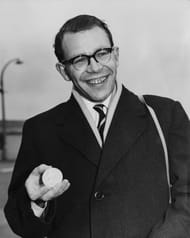
Well, if you thought Dorando Pietri was the most unlucky Olympic champion ever, you haven't met Chris Brasher yet. Dorando was helped to victory, but Chris was almost stripped of his gold for absolutely no fault of his. Before he made a name in sports journalism, Chris won a gold in the weirdest, most dramatic fashion ever.
In Melbourne, Brasher's item was the steeplechase. He finished first in the 3,000 meters steeplechase with a time of 8 minutes 41.2 seconds. This was a surprise not only for Great Britain, but also for Brasher himself.
However, Chris was disqualified for allegedly interfering with another runner, Ernst Larsen of Norway. The following day, after an investigation, his gold was reinstated. Brasher had been celebrating for several hours before the delayed medal ceremony. He joked he was “the only Olympic champion to be totally and absolutely slaughtered when he received a medal”.
#2 The Rise of Betty Cuthbert
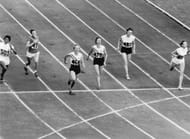
The Melbourne Olympics saw the rise of a new champion, Betty Cuthbert. An 18 year old sprint sensation, she was to Australia what Betty Robinson was to the USA, or what Fanny Koen was to the Netherlands.
Coached by her high school PE teacher June Ferguson, Betty belonged to the Western Suburbs Athletic Club. She was 18 years old when she made her international debut at the Melbourne Games. She was the 'Golden Girl' who won both the 100 meters and the 200 meters at the same edition. She even led Australia to an unexpected gold in the relay race, that too with a world record.
Betty Cuthbert went on to set a world record in 220 yards and another world record in 200 meters in 23.2 seconds at the Australian championships. Though she was the favorite at the Rome Olympics, injuries forced her out. Subsequently, she retired from track and field.
However, Betty couldn't remain off track for long. She came back in style. When the women's 400m was introduced at the Tokyo Olympics, she defeated Ann Packer of Great Britain to clinch the gold in 52.01s.
She is the only Olympian, male or female, to have won gold in all sprint events: 100, 200 and 400 metres. After Tokyo, she retired for good. That same year, she received the Helms Award for her sporting contributions.
#3 Love in Melbourne
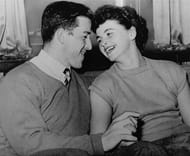
From the victory of Spyridon Louis, to the rise of Jesse Owens, the Olympics has been a symbol of victory against all odds. But is the Olympics also a place to find true love?
The answer was yes, at least for Hal Connolly and Olga Fikotova. Hal was a differently abled hammer thrower from America. Olga Fikotova was a medical student who threw the discus for Czechoslovakia. Both won gold medals for their respective countries at the Melbourne Olympics.
However, the story didn't end there. Olga found a liking for Hal, as Hal did for her. To quote Olga herself,
"But somehow fate brought us together, and we found that although we were from opposite or far away corners of the world, and definitely from political systems that seemed to be completely incompatible, that when it came to basic human values and observations, we were extremely similar. We were trying to converse in my very fragmented English, and his fragmented German, because he'd travelled in Germany before. We were kind of putting together ideas and views and we were surprisingly close together. From that developed, besides curiosity and friendship, also a feeling of love."
The two couldn't think of being separated from each other. So they decided to marry. Initially, they thought of a private wedding, away from the public glare. However, Olga decided to invite Emil and Dana Zatopek, her confidantes, as witnesses. Of course, the event received full public coverage.
After moving to the U.S., Olga wanted to continue representing Czechoslovakia, but the Czechoslovak Olympic Committee wouldn't budge. To make things worse, word spread that Olga had refused to represent Czechoslovakia. She was ostracized by several of her former compatriots for years before the truth came out. After the fiasco, Olga competed as an American. She even carried the American flag at the Munich Olympics 1972.
#4 Indian Hockey's 6th consecutive gold medal
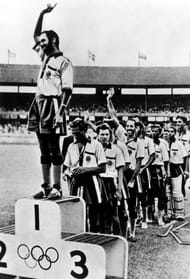
While love blossomed at the Melbourne Olympics, Indian hockey had a different love story altogether. As a British colony, the team had won three golds in a row. As an independent country, it added two more to the kitty.
Now in Melbourne, could India win a sixth consecutive gold? It did, and in style! India set a unique record, equaled only by Argentina in football: a 'golden slate'. India did not concede a single goal on its way to victory!
Yes, you read it right. While India scored a whopping 38 goals at the 1956 Olympics, nobody could score even one goal against them, courtesy of India's original 'Wall'. His name was Shankar Lakshman Shekhawat. Originally a football goalkeeper who was selected to the hockey team, he made his Olympic debut in style.
Guess who India faced off against in the finals? Pakistan. It was an intense game, with neither side ready to budge. Randhir Singh Gentle scored the only goal of the match in India's favor.
#5 When Indian football almost created history
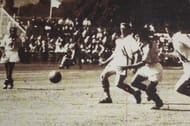
1956 was also the year Indian football almost created history. Back in 1950s, India was a stronger team. A good comparison would be with today's South Korea.
In 1948, India made it to the London Olympics. The team played their first ever knockout match against France. Sangparani Raman scored the first ever goal for India. Had they not missed a penalty, they would have held the powerful France to a historic draw.
In 1952, India went to Helsinki. However, the team sank without a trace, losing to Yugoslavia 10-1. But in Melbourne, history awaited.
For various reasons, many teams boycotted Melbourne 1956. When Hungary withdrew from the pre-quarterfinals, India directly qualified for the quarterfinals. Here they faced the hosts, Australia. Expectations weren't exactly high.
India was coached by Syed Abdul Rahim, whose then unconventional tactics later became the norm in South American football. Thanks to these tactics, India shocked Australia by 4-2. Neville D. Souza scored a hat-trick while Krishnaswamy aka Kittu scored the other goal.
India was the first ever Asian football team to enter the Olympic semifinals. They faced Yugoslavia again. To everyone's surprise, a better-prepared India held the Balkan nation to a draw in the first half. However, India wilted under expectations, and went down 4-1. Unfortunately, the fourth goal was an own goal from Muhammad Salaam.
